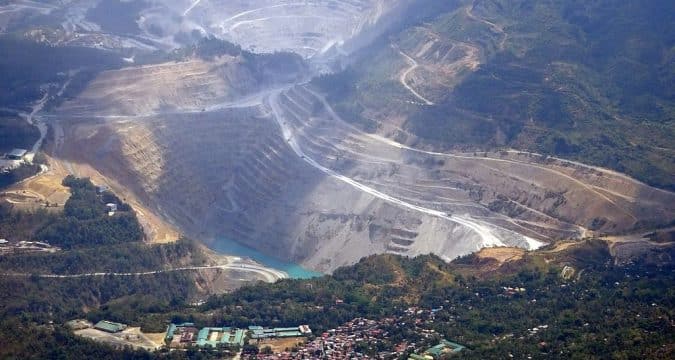
MANILA (UCAN): The Philippine Supreme Court told two giant mining firms to wind up their operations in environmentally protected areas due to opposition from indigenous people and the Church.
On August 16, the court issued a writ of kalikasan [nature] against Ipilan Nickel Corporation and Celestial Nickel Mining and Exploration Corporation for allegedly operating in protected areas on the island of Palawan, southwest of the main island of Luzon.
The writ, a legal remedy against environmental degradation that threatens life, health or property of people in two or more cities, was issued in response to a complaint by indigenous groups, who claimed their rights to a “healthy and balanced ecology” had been violated.
Under a 1993 pact with the government, Celestial Nickel occupied 3,000 hectares of land in Brooke’s Point in Palawan. Ipilan Nickel Corporation is a subsidiary of Global Ferronickel Holdings, which deals with exploration, extraction, production and marketing of nickel ore.
The Philippines has rich deposits of copper, gold, nickel and other minerals. The country’s strategic location on one of the world’s busiest trade routes helps their easy trade.
The writ, a legal remedy against environmental degradation that threatens life, health or property of people in two or more cities, was issued in response to a complaint by indigenous groups, who claimed their rights to a ‘healthy and balanced ecology’ had been violated
The petition, filed by indigenous cultural communities, said the firms operated without a permit from the Environmental Department.
“When notified that its Environmental Compliance Certificate [ECC] expired in October 2015, Ipilan Nickel Corporation and Celestial Nickel Mining and Exploration Corporation nevertheless continued with their tree-cutting activities, which the indigenous people claim has caused the deforestation,” the Supreme Court said.
In 2018, Ipilan failed to secure the nod from the National Commission on Indigenous Peoples. However, it continued with its operations, the court observed.
Speaking on condition of anonymity, a lawyer representing the mining firms said they would appeal the verdict and declined to comment further.
As we celebrate the 500 years of Christianity in the Philippines. The Chaplaincy to Filipino Migrants organises an on-line talk every Tuesday at 9.00pm. You can join us at:
https://www.Facebook.com/CFM-Gifted-to-give-101039001847033
The indigenous cultural communities in Maasin, Barangays, Barong-Barong, Aribungos, and Mambalot claimed that these firms operated due to purported connections with government officials.
“Of course, they [mining firms] bribed those who issue the permits. We don’t have evidence of it right now. But, it is unthinkable how they could operate until 2023 since their ECC expired in 2015,” environmental activist, Joel Tunggihan, said.
When notified that its Environmental Compliance Certificate [ECC] expired in October 2015, Ipilan Nickel Corporation and Celestial Nickel Mining and Exploration Corporation nevertheless continued with their tree-cutting activities, which the indigenous people claim has caused the deforestation
Philippine Supreme Court
Tunggihan said they had been protesting against the two mining firms, but justice remained elusive due to a lack of funds and political support.
“We could not even hire a lawyer to draft the petition for the issuance of the writ of kalikasan. … But, it has changed,” Tunggihan said.
After an outcry from the cultural communities, the local government decided to revoke the business permit of the mining firms in September 2022, he said.
Environmental experts claimed that Palawan province lost large number of trees due to illegal mining operations.
“In the Philippines, the top 11 regions were responsible for 51 per cent of forest cover loss between 2001 and 2020,” Maria Carley Plorifera, who teaches at Palawan State University, said, adding, “Palawan had a maximum loss of 163,000 hectares.”
She said, “They [mining firms] bribed leaders of the indigenous communities to elicit their support.”
The leaders, however, have denied the allegations.
Of course, they [mining firms] bribed those who issue the permits. We don’t have evidence of it right now. But, it is unthinkable how they could operate until 2023 since their ECC expired in 2015
Joel Tunggihan
“We have received nothing but were promised jobs by the mining corporations. If that is what they call a ‘bribe’ then perhaps we were bribed because we were given jobs in the mining sites,” said Arnulfo Casioco, a leader from the Batak community, one of among 140 indigenous tribal people in the country.
The Batak people live mainly in the northeastern portions of Palawan.
“With regard to money, ask those in government if they have received millions in cash,” Casioco said, while accusing the government of land grabbing in ancestral domains.
“Our leaders should protect us… not sell us to those who have money. We have laws, very good laws. But when money is involved, there’s always a gray area. Mining firms could operate even without permits,” he said.
The Church has been backing the indigenous people in their fight against the mining firms. On February 22, two bishops from Palawan, Bishop Socrates Mesionia of Puerto Prinsesa, and Bishop Broderick Pabillo of Taytay, along with 65 priests, joined a protest by indigenous people who barricaded the entrance of the mining firms.
The protest called for an end to the mining corporations’ “rampant” violation of environmental and indigenous peoples’ laws.
“The natural beauty and natural resources of Palawan are unique, so it is but fitting that we give her a unique kind of care so that we can ensure that future generations can benefit from the things that we enjoy today,” the bishops said in a statement in June while attending a protest rally organised by the locals.
“To be God’s responsible steward of creation is a huge moral responsibility,” the bishops said.



